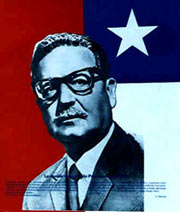31st anniversary of Chile coup

At about 0600 on 11 September 1973, Chilean President Salvador Allende awoke to the news that his own navy had turned against him. Within hours the presidential palace was in flames and Allende was dead.
That September 11, in 1973, also saw planes flying low over a country's largest city, leaving one of its most important buildings in flames and its people in a state of shock. But in Chile it was the bombing of the La Moneda presidential palace, where the elected president, Salvador Allende, died. The attack inaugurated a bloodbath from which Chile has yet to recover.
Ironically, the official death toll in the Chilean coup—3,197—is almost identical to the number killed on September 11, 2001 in the US. Several hundred were machine-gunned in the Santiago soccer stadium, which was turned into a makeshift concentration camp and torture center. Others were shot to death in the street, at military barracks and in other detention centers, many after enduing horrific torture. All told, more than 60,000 Chileans were subjected to torture under the dictatorship, and one million were forced into exile: this in a country of less than 14 million.
That many Chileans, while understanding the pain of those who lost relatives in the US, find it difficult to solidarize themselves with Washington is understandable. The Chilean coup was sponsored by Washington and the Central Intelligence Agency, which funneled millions of dollars to both the military and right-wing groups to overthrow the country’s elected government.
President Richard Nixon and his top foreign policy adviser, Henry Kissinger, played direct roles in orchestrating the military overthrow. The latter had famously remarked, "I don’t see why we need to stand by and watch a country go communist because of the irresponsibility of its own people."
Washington continued its backing for the dictatorship of General Augusto Pinochet, with the CIA providing lists of suspected "subversives" to be exterminated. American aid helped the mass murderer stay in power longer than any other Latin American military ruler.


At about 0600 on 11 September 1973, Chilean President Salvador Allende awoke to the news that his own navy had turned against him. Within hours the presidential palace was in flames and Allende was dead.
That September 11, in 1973, also saw planes flying low over a country's largest city, leaving one of its most important buildings in flames and its people in a state of shock. But in Chile it was the bombing of the La Moneda presidential palace, where the elected president, Salvador Allende, died. The attack inaugurated a bloodbath from which Chile has yet to recover.
Ironically, the official death toll in the Chilean coup—3,197—is almost identical to the number killed on September 11, 2001 in the US. Several hundred were machine-gunned in the Santiago soccer stadium, which was turned into a makeshift concentration camp and torture center. Others were shot to death in the street, at military barracks and in other detention centers, many after enduing horrific torture. All told, more than 60,000 Chileans were subjected to torture under the dictatorship, and one million were forced into exile: this in a country of less than 14 million.
That many Chileans, while understanding the pain of those who lost relatives in the US, find it difficult to solidarize themselves with Washington is understandable. The Chilean coup was sponsored by Washington and the Central Intelligence Agency, which funneled millions of dollars to both the military and right-wing groups to overthrow the country’s elected government.
President Richard Nixon and his top foreign policy adviser, Henry Kissinger, played direct roles in orchestrating the military overthrow. The latter had famously remarked, "I don’t see why we need to stand by and watch a country go communist because of the irresponsibility of its own people."
Washington continued its backing for the dictatorship of General Augusto Pinochet, with the CIA providing lists of suspected "subversives" to be exterminated. American aid helped the mass murderer stay in power longer than any other Latin American military ruler.

Props:
Gr4mx619




